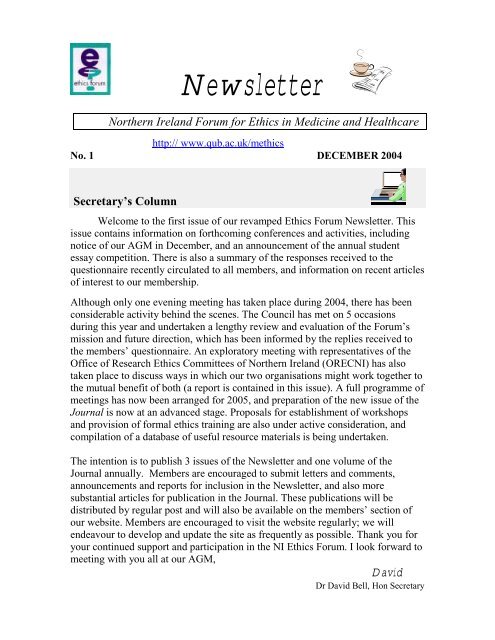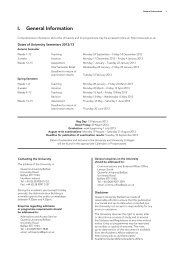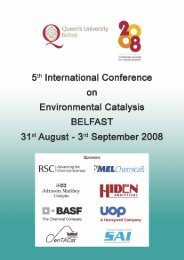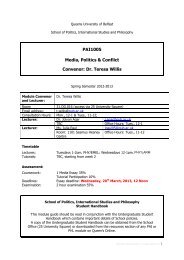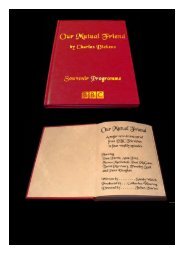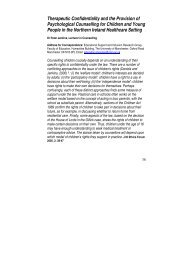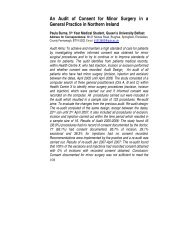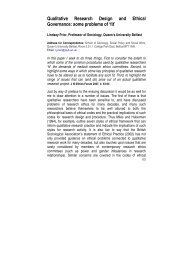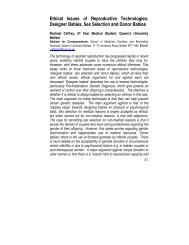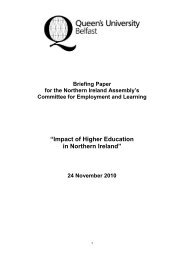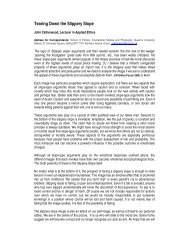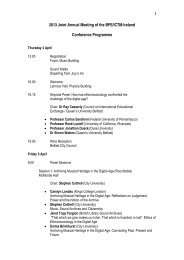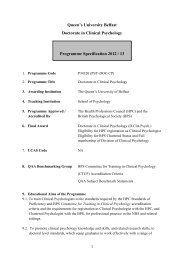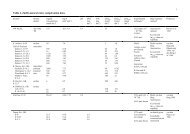Newsletter - Queen's University Belfast
Newsletter - Queen's University Belfast
Newsletter - Queen's University Belfast
You also want an ePaper? Increase the reach of your titles
YUMPU automatically turns print PDFs into web optimized ePapers that Google loves.
<strong>Newsletter</strong><br />
Northern Ireland Forum for Ethics in Medicine and Healthcare<br />
http:// www.qub.ac.uk/methics<br />
No. 1 DECEMBER 2004<br />
Secretary’s Column<br />
Welcome to the first issue of our revamped Ethics Forum <strong>Newsletter</strong>. This<br />
issue contains information on forthcoming conferences and activities, including<br />
notice of our AGM in December, and an announcement of the annual student<br />
essay competition. There is also a summary of the responses received to the<br />
questionnaire recently circulated to all members, and information on recent articles<br />
of interest to our membership.<br />
Although only one evening meeting has taken place during 2004, there has been<br />
considerable activity behind the scenes. The Council has met on 5 occasions<br />
during this year and undertaken a lengthy review and evaluation of the Forum’s<br />
mission and future direction, which has been informed by the replies received to<br />
the members’ questionnaire. An exploratory meeting with representatives of the<br />
Office of Research Ethics Committees of Northern Ireland (ORECNI) has also<br />
taken place to discuss ways in which our two organisations might work together to<br />
the mutual benefit of both (a report is contained in this issue). A full programme of<br />
meetings has now been arranged for 2005, and preparation of the new issue of the<br />
Journal is now at an advanced stage. Proposals for establishment of workshops<br />
and provision of formal ethics training are also under active consideration, and<br />
compilation of a database of useful resource materials is being undertaken.<br />
The intention is to publish 3 issues of the <strong>Newsletter</strong> and one volume of the<br />
Journal annually. Members are encouraged to submit letters and comments,<br />
announcements and reports for inclusion in the <strong>Newsletter</strong>, and also more<br />
substantial articles for publication in the Journal. These publications will be<br />
distributed by regular post and will also be available on the members’ section of<br />
our website. Members are encouraged to visit the website regularly; we will<br />
endeavour to develop and update the site as frequently as possible. Thank you for<br />
your continued support and participation in the NI Ethics Forum. I look forward to<br />
meeting with you all at our AGM,<br />
David<br />
Dr David Bell, Hon Secretary
Forthcoming Meetings<br />
(Dates for your diary)<br />
2 nd Year Medical Students at QUB will be debating the issue ‘Should<br />
doctors who perform voluntary active euthanasia on their patients be punished?’<br />
The debate will be chaired by Dr James Douglas (Consultant Nephrologist, BCH<br />
Trust) and will be held at the QUB Lower Lecture Theatre, Institute of Clinical<br />
Science, Royal Victoria Hospital on Wednesday 8 th December from 1.30pm-<br />
3.30pm. All Forum Members are cordially invited to attend this debate.<br />
Our next evening meeting will be a debate on the topic ‘Health Fascists and<br />
Smokers’ Rights: banning smoking in public places’. Speakers will include Dr<br />
John Catherwood (Lecturer in Applied Ethics, QUB) and Dr Gerry McElwee<br />
(Ulster Cancer Foundation/Action on Smoking and Health).<br />
The debate will be held on Wednesday 8 th December at 6.30pm in the<br />
Postgraduate Lecture Theatre, <strong>Belfast</strong> City Hospital Trust and will be followed by<br />
our Annual General Meeting 2004. A buffet tea will be served in the foyer of the<br />
Postgraduate Centre from 6.00pm.<br />
Members who have items they wish to have included on the agenda for the AGM<br />
should forward these to the Honorary Secretary as soon as possible.<br />
Our annual conference will take place on Saturday 5 th March 2005 at the Peter<br />
Froggatt Centre, QUB, and will focus on the subject of ‘Stem Cell Research: what<br />
can we do and what should we do?’ Confirmed speakers to date include: Dr Grant<br />
Jordan (Trauma and Orthopaedic Surgery, QUB Medical School), Professor Tony<br />
McGlennan (School of Law, <strong>University</strong> of Ulster), Father Gary Toman (Chaplain,<br />
QUB) and Rev Dr William Crawley (Chaplain, UUJ, and presenter on BBC<br />
Radio’s Sunday Sequence). Further information and registration forms will be<br />
circulated to members in advance of the meeting.
A further evening meeting will be organised for late May/early June 2005.<br />
Suggested themes currently under consideration by council include Withholding<br />
Treatment, The Four Principles, and Designer Babies. Members are encouraged to<br />
forward any alternative suggestions to the Council for consideration.<br />
Previous Meetings<br />
At our evening meeting held at 7 Lennoxvale on 24 th March 2004, members<br />
engaged in an excellent debate on the topic ‘Are disabled people made in God’s<br />
image?’ It was particularly good to welcome a number of new members to the<br />
Forum, including some new student members. Our thanks are extended to our<br />
speakers, Rev Dr Harold Cunningham (Institute of Theology, QUB) and Rev Dr<br />
Alan Russell (Ballywalter Presbyterian Church) for a stimulating exploration of<br />
the issues. Their key arguments will be summarised in the forthcoming edition of<br />
the Forum’s Journal.<br />
Undergraduate Student Essay Competition<br />
The NI Ethics Forum Essay Competition is held annually. This year a prize of<br />
£100 will be awarded for the best undergraduate student essay on a topic of the<br />
entrant’s own choice within the broad remit of ‘health and social care ethics’. The<br />
competition is open to all registered undergraduate students within any Faculty in<br />
Queen’s <strong>University</strong> <strong>Belfast</strong> or the <strong>University</strong> of Ulster.<br />
Essays (recommended word limit 1,500 words) should be word-processed<br />
(double-spaced, A4) and two copies submitted to the Honorary Secretary before<br />
the closing date of Friday 13 th May, 2005. Suggested essay topics include:-<br />
Legalisation of VAE; withholding and withdrawing treatment; Human Tissue Bill;<br />
Organ Transplantation; Abortion; Designer Babies; Ethical issues in Health<br />
Promotion; Ethical issues in Reproductive Technologies; Stem Cell Research;<br />
healthcare rationing; social equality, discrimination and rights.<br />
The above list is not exhaustive and entrants may wish to write on an alternative<br />
topic of their own choosing. Further information can be provided on request.<br />
Members, particularly those who hold academic appointments in either <strong>University</strong>,<br />
are asked to bring this competition to the attention of undergraduate students in<br />
their Schools and Faculties.<br />
The Council are also giving active consideration to provision of a postgraduate<br />
student prize; further information about this will be disseminated shortly.
Formation Of The Office for Research Ethics Committees in Northern Ireland<br />
New ethical review arrangements for research involving human subjects, tissue or<br />
data came into force in Northern Ireland on 1 st May 2004, to comply with a<br />
European Union Directive on Clinical Trials. HPSS Research Ethics Committees<br />
have been established by the DHSSPS, with members appointed through a public<br />
appointment process. These committees are generalist (that is, capable of<br />
considering the ethics of all proposed research projects which involve human<br />
subjects, their tissue or data in relation to biomedical and social care research) and<br />
each has a remit covering the whole of Northern Ireland, meeting monthly, thereby<br />
creating a system where a committee will meet most weeks of the year, capable of<br />
reviewing any research proposal.<br />
The mission of OREC is to support Research Ethics Committee arrangements in<br />
Northern Ireland, and to ensure that HPSS RECs are able to comply with<br />
Governance Arrangements for Research Ethics Committees (GAfREC) and the<br />
Medicines for Human Use (Clinical Trials) Regulations 2004 (UK Regulations<br />
2004). These regulations transpose the European Directive 2001/20/EC relating to<br />
good clinical practice in the conduct of trials on medicinal products for human use.<br />
OREC will work closely with the Department of Health, Social Services & Public<br />
Safety (DHSSPS) to ensure that the new arrangements are fit for purpose, and that<br />
the HPSS REC chairs, members, researchers, HPSS managers and the wider<br />
community all understand the new arrangements for ethical review.<br />
Council members of the Northern Ireland Forum for Ethics in Medicine and<br />
Healthcare recently held exploratory talks with representatives of ORECNI, to<br />
identify areas in which we might be able to work together for the mutual benefit of<br />
both organisations. Areas in which co-operation might be possible include<br />
occasional joint meetings such as our forthcoming conference on Stem Cell<br />
Research, organisation of more regular joint workshops on a smaller scale to<br />
address topics of specific interest to sections of our membership such as the<br />
implications of the Human Tissue Bill, Ethical issues in Genetics, Ethics of Drugbased<br />
Research to mention just a few, and provision of expert speakers from<br />
amongst the membership of the Ethics Forum and/or pooling of resources to invite<br />
keynote speakers from outside of Northern Ireland to facilitate identified training<br />
needs of HPSS REC members and our own membership. It is hoped that a fruitful<br />
partnership between our respective organisations can be forged and Council will<br />
keep members updated as discussions progress.<br />
Further information about the new ethical review arrangements are available via<br />
the ORECNI website http://www.orecni.org.uk
Questionnaire<br />
A questionnaire was distributed to the membership in March. Although the<br />
number of replies received was relatively small (~30) a number of trends did<br />
emerge and the information provided has been of assistance to Council in planning<br />
future meetings and activities.<br />
The consensus was that the Forum should hold two weekday evening meetings,<br />
and a full or half-day Saturday conference annually, with the venue alternating<br />
between QUB, RVH/BCH and a venue outside of the Greater <strong>Belfast</strong> Area (for<br />
example, <strong>University</strong> of Ulster, or the Craigavon, Antrim or Altnagelvin Trusts).<br />
Members favoured meetings focused on a single topic with a panel of speakers<br />
exploring the topic from various angles, before opening the meeting to plenary<br />
discussion. A number of topics and potential speakers were identified and Council<br />
are actively pursuing some of these. There was also interest in forging links with<br />
other Ethics Associations within the British Isles, with a view to occasional joint<br />
meetings and sharing of resources. This suggestion will be explored by Council.<br />
The majority of respondents favoured the facilitation by the Forum of a<br />
programme of workshops during the year, ideally for 10-20 participants, to explore<br />
topics of particular interest to each grouping in greater depth. Consideration would<br />
also be given to the formation of working groups, meeting regularly and focusing<br />
on emerging developments in regard to specific issues and themes, for example,<br />
end of life decisions, reproductive technology, genetics etc. Council will<br />
endeavour to meet these requests and to identify members with expertise in the<br />
appropriate areas to facilitate such initiatives.<br />
A number of respondents already contribute to delivery of ethics teaching within<br />
QUB and the <strong>University</strong> of Ulster, particularly through the student selected<br />
component programme for medical students, inter-professional education for<br />
nurses, doctors and pharmacists, and ethics modules within undergraduate and<br />
specialist practice Nursing, Law, Theology and Philosophy. A report on the<br />
integration of ethics teaching within the undergraduate medical curriculum in<br />
Northern Ireland has been compiled by Bob Taylor and will be featured in the<br />
forthcoming issue of the Journal. A number of NHS clinicians have expressed<br />
interest in contributing to undergraduate ethics training, and consideration is also<br />
being given to introduction of an intercalated BMedSc degree in Healthcare Ethics<br />
and Law for QUB Medical students.<br />
Several respondents already possessed a formal qualification in Healthcare Ethics<br />
(certificate, diploma, MA, MPhil), but many of those who did not at present,<br />
indicated that they would be very interested in undertaking an appropriate course.
While this is primarily an issue for the Universities within Northern Ireland, the<br />
Forum will actively support any proposals to enable introduction of such a course.<br />
In regard to publications, preference was evenly divided between email or<br />
hardcopy of the <strong>Newsletter</strong> (the current issue has been sent by regular post, and<br />
was also emailed to those members who had provided an email address.). More<br />
effective use should be made of the <strong>Newsletter</strong> to disseminate information<br />
regularly to members, advise them of the matters discussed by Council, and<br />
highlight resources of interest, such as papers published recently in Ethics’<br />
Journals. The majority of respondents favoured receiving a hardcopy of the<br />
Forum’s own Journal. In response to suggestions received, the forthcoming issue<br />
will contain papers presented at recent meetings, but also articles from student<br />
members, invited contributions from specialists in particular fields, and updates on<br />
local, national and international debates/cases of ethical interest.<br />
The Website is accessed relatively infrequently by members at present. In addition<br />
to mission statement and membership application form, contact details of Council<br />
Members and Register of Members’ Interests to facilitate networking, information<br />
about forthcoming meetings, and copies of our <strong>Newsletter</strong> and Journal, it was felt<br />
that the discussion forum and links to useful sites/sources of information should be<br />
a priority. Council will endeavour to address this matter, and the Secretary will<br />
continue to liaise closely with Karen Agnew, whose assistance in development and<br />
maintenance of the website is much appreciated. In future, access to the discussion<br />
forum, resource materials and Forum publications will be restricted to members<br />
only. Usernames and passwords can be obtained from the Secretary.<br />
Membership Database<br />
The membership database is currently being updated. Although the previous<br />
database compiled over a period of several years contained 270 names, not all<br />
members had remained active in the Forum and were in good standing, and many<br />
contact details, especially email addresses are not correct. In response to the recent<br />
mail-shot 57 members have updated their membership details, and a further 23<br />
members have not updated their membership details but continue to pay<br />
subscription fees by standing order, making a total active membership of<br />
approximately 80. Those who have not already done so are encouraged to renew<br />
their membership and update their membership details as soon as possible.<br />
A new leaflet /brochure is currently being printed, and we would request the<br />
assistance of all of our members in recruiting colleagues to the Forum. Academic<br />
staff are asked to help with publicising the work of the Forum amongst the student<br />
community. Copies of the leaflet can be obtained from the Honorary Secretary.
Recent articles of interest published in the Journal of Medical Ethics:<br />
Gillon, R. Ethics needs principles- four can encompass the rest- and respect for<br />
autonomy should be first among equals. J Med Ethics, 29: 307-312, 2003<br />
Boyle, R.J., Salter, R., Arnander M.W. Ethics of refusing parental requests to<br />
withhold or withdraw treatment from their premature baby. J Med Ethics, 30: 402-<br />
405, 2004.<br />
Towns, C.R., Jones, D.G. Stem cells, embryos and the environment: a context for<br />
both science and ethics. J Med Ethics, 30: 410-413, 2004.<br />
Van Delden, J.J.M. The unfeasibility of requests for euthanasia in advance<br />
directives. J Med Ethics, 30: 447-451, 2004.<br />
Preece, P., Roff, S. Helping medical students to find their moral compasses:<br />
ethics teaching for second and third year undergraduates. J Med Ethics, 30: 490-<br />
493.<br />
Recommended Training Resources<br />
The Ethics OSCE: standardised patient scenarios for teaching and evaluating<br />
bioethics. Produced by EFPO (Educating Future Physicians for Ontario). A series<br />
of twelve scenarios, accompanied by a training materials and a video, focusing on<br />
issues including decisions to forego treatment, confidentiality and truth telling.<br />
http://wings.buffalo.edu/faculty/research/ bioethics/osce.html<br />
Medical Ethics: a case based approach.<br />
Editors: Schwartz, L, Preece, P.E., Hendry, R.A.<br />
2002: Saunders, London<br />
Medical Ethics and Law: the core curriculum.<br />
Editors: Hope, T., Savulescu, J., Hendrick, J.<br />
2003: Churchill Livingstone, London
Legal Briefs: a roundup of some recent significant law cases<br />
! General Medical Council<br />
! Shipman Inquiry<br />
! Coroners Courts<br />
! Misconduct<br />
! Consent<br />
! Mental Health<br />
! General Medical Council<br />
It has not been a good year for the GMC, for the second year in succession. Since<br />
the beginning of 2002, there has been an unprecedented number of determinations<br />
of the Professional Conduct Committee overturned or dismissed by the Privy<br />
Council who, since 2 nd October 2000, are required to judge the decision-making of<br />
the GMC’s tribunals and panels in the light of the Human Rights Act 1998 and the<br />
European Convention on Human Rights. Of the 15 appeals which their Lordships<br />
heard, two appellants had their erasures reduced to lesser punishments and one had<br />
his finding overturned. Twelve others were dismissed.<br />
But the most significant threat to the GMC’s much-prized independence came<br />
from a newly established statutory body, initially called the Council for the<br />
Regulation of Healthcare Professionals (CRHP) and now re-named the Council for<br />
Healthcare Regulatory Excellence (CHRE). In October 2004 it won a test case<br />
establishing its right of referral to the English High Court to a penalty imposed<br />
upon a doctor by the GMC considering it ‘too lenient’ and ‘inadequate’. Council<br />
for the Regulation of Healthcare Professionals v. General Medical Council<br />
and Ruscillo [2004] EWCA Civ 1356. Additional new evidence of misconduct<br />
could also be brought to the attention of the High Court in such a case by the<br />
CRHP if it was truly in the public interest and the GMC’s penalty was ‘manifestly<br />
inappropriate’. The new CHRE intends to exercise it regulatory role even more<br />
robustly in future, on foot of this precedent.<br />
! Shipman Inquiry<br />
The suicide by hanging of Dr. Harold Shipman in January 2004 did little to avert<br />
the attention of Dame Janet Smith’s Inquiry into the murders of his 260 victims.<br />
From the outset, the GMC realised that it could not escape censure, having treated<br />
Shipman too lightly in 1976 when his drug-dependency first came to light in the<br />
criminal courts and failing to ‘protect patients’ by inadequately supervising his<br />
professional career. What came as a profound shock to the Council was the<br />
vehemence of Dame Janet’s criticism, conveyed to the GMC in the form of a
‘salmon letter’ in February 2004, which is used by inquiries to notify interested<br />
parties of their exposed position and inviting supplementary depositions in their<br />
defence. Following personal presentations of the Council’s position before the<br />
Inquiry by Sir Graeme Catto, President, and Finlay Scott, Chief Executive, the<br />
letter accused the GMC of being self-serving, biased in favour of doctors, too<br />
secretive, and of acting through “expediency rather than principle.” Whether the<br />
Council’s rebuttal has mollified the Inquiry’s criticism will be apparent when<br />
Phase 5 of the Shipman Inquiry is published in early 2005. Senior lay Council<br />
members are already rehearsing a Requiem for the GMC.<br />
Seven doctors are facing disciplinary action before the GMC’s Fitness to Practice<br />
procedures, six GPs and one pathologist. The GPs had worked in practices<br />
adjacent to Dr. Shipman’s, a single-handed GP, and were implicated in the<br />
completion of an unusually high number of Cremation Certificates at his request,<br />
which they attributed to a demographic age skew. The death following the<br />
administration of a high dose of morphine on an asthmatic patient was not so<br />
easily explained statistically by the pathologist. However, in October 2004, the<br />
GMC cleared him of serious professional misconduct charges referred by Dane<br />
Janet Smith’s Inquiry. Now retired, he was commended by the GMC for the<br />
‘quality of his testimonials’. The Professional Conduct Committee refused to<br />
speculate on whether any lives might have been saved had he detected the ‘alarm<br />
bells’ ringing in 1995. But the reader may wish to.<br />
! Coroners Courts<br />
2004 has proved to be a critical year in the development of a new jurisprudence for<br />
the Coroners Courts in both the Northern Ireland and the English jurisdictions. It<br />
has undergone a paradigm shift following the House of Lords decision in 11<br />
March 2004, R (Middleton) v. West Somerset Coroner and Another [2004]<br />
UKHL 10. Prior to this judgment coroners and juries were prohibited from<br />
commenting beyond the immediate ‘cause of death’ in a narrow verdict (or<br />
‘findings’ in Northern Ireland). Since the decision in Middleton, our Coroners<br />
Courts have been inquiring into the ‘broad circumstances surrounding a death’, a<br />
much wider remit. Already the Coroner’s extended inquisition has begun to<br />
comment upon ‘systems failures’ in our hospitals and amongst our healthcare<br />
professionals. Under Rule 23 (2) of the Coroners (Procedures and Practice) Rules<br />
(NI) Act 1963, the Coroner has had the responsibility of informing a regulator,<br />
such as the GMC, in order to prevent recurrence of similar systems failures in<br />
future. In the past this was rarely used but now combined with Middleton, Rule<br />
23(2) is likely to be used with increasing frequency to facilitate the Coroner in the<br />
application of his or her preventative role. With its new investigative function, the<br />
GMC may have to shift its attention beyond sanctioning individual doctors, who<br />
are too often juniors, towards a more systematic analysis approach. If the GMC is<br />
unable to do so, the Government may consider abolishing it self-regulation and
eplace the Council with a generic regulator body composed of users rather than<br />
providers.<br />
In the Northern Ireland Court of Appeal an equally progressive judgement was<br />
delivered on 10 September 2004. In Jordan, Re: Application for Judicial Review<br />
[2004] NICA 29 and 30, the Court dealt with the issue of whether to apply the<br />
Human Rights Act 1998 to inquests into deaths occurring before October 2000,<br />
when the Act first came into effect. A backlog of such cases awaiting inquest since<br />
1992 includes the so called ‘shoot-to-kills’ involving allegations of state collusions<br />
in the fatal shootings of paramilitaries. This judgment confirmed the relevance of<br />
Middleton to Northern Ireland inquests. While acknowledging that the Human<br />
Rights Act could not be applied retrospectively, the NI Coroners Courts would<br />
operate any future inquest in a manner compliant with the European Convention<br />
on Human Rights Article 2, ‘The Right to Life’. In so doing, our Northern Ireland<br />
Coroners will assert their independence beyond question. The healthcare<br />
profession will be shown the usual courtesy but they should not expect to be<br />
shown undue deference. They should be warned that the modern coroner is not<br />
medically illiterate just because he is a lawyer.<br />
! Misconduct - sexual<br />
Professional Conduct Committees of the GMC still have a proper interest in the<br />
sexual misconduct of registered medical practitioners, though it is much more<br />
tolerant of some earlier taboos. In the recent ‘Operation Ore’ into the internet<br />
access of child pornography, the police arrested over 3500 people, convicting<br />
1230. As a result of the notification of these criminal convictions involving<br />
doctors, the GMC has amended its ‘sanctions guidance’ in order to be clearer and<br />
more consistent in its approach, speed of action being critical. So far, two doctors<br />
have been struck off and two suspended. Nothing but exceptional mitigating<br />
circumstances might avoid the “only proportionate sanction – erasure”. Of<br />
course, inclusion on the sex offenders’ register for a minimum of five years is<br />
automatic with such a criminal conviction.<br />
! Consent<br />
In Chester v Afshar [2004] UKHL 41, the House of Lords upheld the English<br />
Court of Appeal decision that a patient whose doctor failed to warn her of a risk<br />
inherent in surgery to which he was obtaining her consent and who suffered injury<br />
when the risk eventuated, sufficiently satisfied the test for causation where she<br />
could prove that if she had been properly informed she would not have undergone<br />
the surgery which was in fact performed. The patient in this case had consented to<br />
lumbar surgery from a neurosurgeon but suffered post-operative partial paralysis<br />
of which she had not been warned. Even though the operator was in no way
negligent, he was judged as not having received informed consent. Their<br />
Lordship’s decision was a departure from the long standing principle which<br />
previously would have been expected to hold that the surgeon’s negligent failure<br />
to warn had not caused her injury. In future, do not suppose that a simple consent<br />
form can be considered sufficient to avoid liability in similar circumstances.<br />
! Mental Health<br />
In October 2004, in H.L. v United Kingdom (application no. 45508/99), the<br />
European Court of Human Rights ruled that the human right of liberty of a 55 year<br />
old man, known only as HL, was violated by his being detained informally in a<br />
psychiatric hospital for more than four months. In the instant case, the man was<br />
suffering from a learning disability, autism, but the judgment has wider<br />
implications for other apparently ‘compliant’ patients with dementia, who lack the<br />
capacity to consent or to object to treatment. An earlier judgment by the House of<br />
Lords held that his detention was permissible under common law, using<br />
‘necessity’ as justification. Parliament is likely to amend the English Mental<br />
Capacity Bill on foot of it. The government’s Mental Health Bill for E&W is also<br />
under fire from both the Law Society and the Royal College of Psychiatrist as the<br />
proposed legislation is likely to breach patients’ human rights. An out-patient<br />
engaging in “specific conduct” which has been banned by the community<br />
psychiatric team may result in an involuntary detention. So, a trip to the pub could<br />
cost a patient his or her liberty. In addition, patients with mental health problems<br />
will become even more stigmatised as a danger to the community. The Royal<br />
College has described the draft bill as “extremely complex, confusing and, some<br />
would say, incomprehensible”. It could induce even more confusion in the minds<br />
of the doctors than of the patients.<br />
Readers are advised that the website of BAILII (the British and Irish Legal<br />
Information Institute) is a direct access site which is free of charge. Using its<br />
Search Engine, a particular case may be located using the case citations given<br />
below at http://www.bailii.org<br />
Thanks are extended to Dr John Burton for compiling this very informative<br />
round-up. In the next issue of the newsletter, John will focus on recent law<br />
cases related to paediatric healthcare issues.
Murder or Mercy?<br />
The Forum extends congratulations to Dr Vivienne Crawford and Dr David Bell<br />
from the Faculty of Medicine and Health Sciences on receiving a QUB Teaching<br />
Award for the 2 nd Year Undergraduate Medicine module, ‘Murder or Mercy? : the<br />
euthanasia debate’. Several members of the Forum contribute to this module<br />
including Dr Bob Taylor (RBHSC), Ann Begley (QUB School of Nursing), Rev<br />
Dr Harold Cunningham (Institute of Theology), Marie Lynch (QUB School of<br />
Law) and Dr John Catherwood (QUB Department of Philosophy), together with<br />
the BCH and RVH Hospital Chaplaincy Services, QUB Chaplains, and staff of<br />
paediatric and adult ICUs at RVH, and the NI Children’s Hospice. Well done to<br />
all concerned!! This module will be showcased in our forthcoming Journal.<br />
Composition of Council<br />
A number of vacancies have arisen on Council and we would like to increase<br />
representation from a number of areas, particularly nursing and midwifery, law<br />
and genetics in order to reflect the broad nature of the Forum’s membership. We<br />
are also seeking representation from amongst the academic staff of the <strong>University</strong><br />
of Ulster. Nominations, together with names of proposer and seconder, and<br />
confirmation that the person nominated has agreed to their name going forward for<br />
consideration, should be submitted to the Honorary Secretary in advance of AGM<br />
on 8 th December. Our thanks are expressed to Professor Roy McClelland and<br />
Professor Tony McGlennan for their sterling contribution to the work of the<br />
Council since the formation of the NI Ethics Forum. Both have recently indicated<br />
their intention to retire from Council at the forthcoming AGM.<br />
The next issue of the <strong>Newsletter</strong> will be published in April 2005.<br />
Contributions for inclusion should be submitted to the Honorary Secretary not<br />
later than 31 st March 2005<br />
Dr David Bell, Hon. Secretary,<br />
Northern Ireland Ethics Forum,<br />
Department of Therapeutics and Pharmacology,<br />
School of Medicine, QUB<br />
Whitla Medical Building,<br />
97 Lisburn Road, <strong>Belfast</strong> BT9 7BL<br />
Tel: 02890 335770<br />
Email: d.bell@qub.ac.uk


